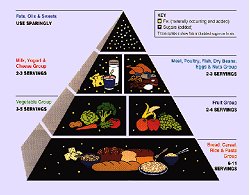 The one key idea now mainstreaming into Western culture, mainly from Chinese medicine, is the concept of "the whole person." The holistic approach to health is to include all the factors making up an individual: physical, emotional, mental, spiritual, environmental, cultural, etc., etc. This "alternative" approach to health seems to be closer to the mark as the testimonials roll in of miraculous healings and longstanding chronic conditions actually resolving (much to the chagrin of "organized medicine").
The one key idea now mainstreaming into Western culture, mainly from Chinese medicine, is the concept of "the whole person." The holistic approach to health is to include all the factors making up an individual: physical, emotional, mental, spiritual, environmental, cultural, etc., etc. This "alternative" approach to health seems to be closer to the mark as the testimonials roll in of miraculous healings and longstanding chronic conditions actually resolving (much to the chagrin of "organized medicine").
But the truth of the matter is that what we unconsciously intend, think and feel affects our bodies. As a child, I wondered if being afraid was bad for my health. I mean, after all, fear caused my heart to beat frantically, made the hair stand up on the back of my neck, sent cold adrenal flushes to my legs and arms, and made the blood run away from my brain. Could that be good for you? Likewise with depression, and all its affiliated physical symptoms. How could anyone think that feelings, intentions and thoughts DIDN'T affect your body?
Also, as a child growing up in the 50's and 60's, all I found out about nutrition was the "four food groups" (later amended to the "food pyramid" with the introduction of SUGAR & FATS, fergawdsakes!). It seemed like eating wasn't really connected to personal health very closely. You could eat just about anything, and if you got sick it was because of germs. This pretty much sums up the extent of health knowledge when I was in school. Sad to say, that pretty much sums up general health knowledge even today among grownups.
Later, as a tie-dyed-in-the-wool hippie, teen angst gave way to young-adult cynicism and the discovery of "commercial interests," and how (oh, my gawd!) they actually manipulated what people ate. They sold fast food that would surely lead to disease, and then sold the medicines to give "instant relief" by masking symptoms, which then came back later so the medicine would have to be purchased again. Shame, shame, I cried, and became a nutrition activist, discovering and campaigning for Ann Wigmore, Viktorus Kulvinskas, and Arnold Ehret's Rational Fasting.
|
| |
| 1,000 Fast Food Restaurants | 23,000 Fast Food Restaurants |
| $6 billion spent on fast food | $100 billion spent on fast food |
| 1/3 of mothers work outside home | 2/3 of mothers work outside home |
| 75% of meals eaten at home | Over 50% of meals eaten away from home |
| All children eat 4-5 servings of fruits and/or veggies | 20% of children 4-5 servings of fruits and/veggies |
Extensive scientific research has been done over recent decades on the mind-body connection, as well as the food-wellness complex, so even the most skeptical cereal-box-HMO hugger may be enlightened. Of course, the free market being what it is, a lot of this scientific research has been harnessed to the service of profit-making often to the point where anyone attempting to figure out what route to wellness to take is going to have their head spinning. Throw in the Internet, and it's usually information overload.
The key, as always, is to find those things that work for YOU. With all the thousands of effective approaches to healing and vibrant health, any individual can find at least one or two things that are real to them, and that will make a difference for them in particular. For example, yoga works for me, along with a fairly light omnivorous diet, supplemented with enzymes, a few vitamins, and lots of water. I'm also a big fan of the Pure Energy Rx products and homeopathic cell salts, since both are an easy system to remember, and they just really work for me. Of course, I've TRIED just about everything, but a few of those things stuck, and are serving me well.
Once the heart-and-soul decision has been made and an intention has been set about a health condition or fitness level, there are general guidelines that seem to show up for most people, based on lots of scientific research and common sense (see chart below). Observe any thoughts and conclusions provided you from commercial interests. Experiment, and make your OWN decisions about what works for you. Assume full responsibility for your body, and it will respond happily.
No comments:
Post a Comment